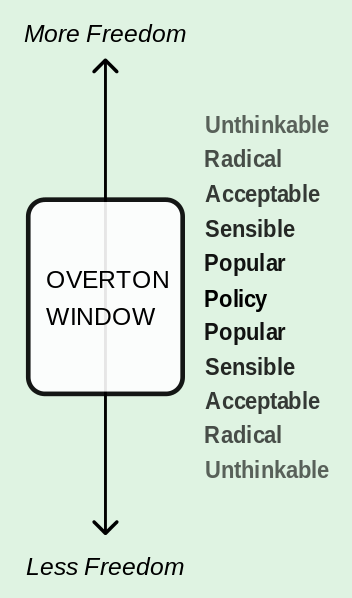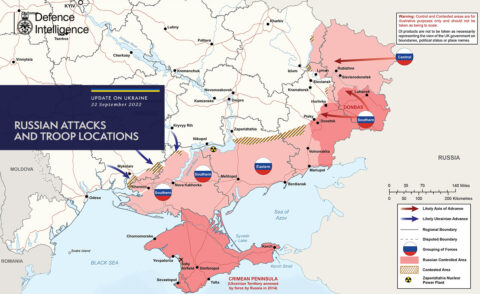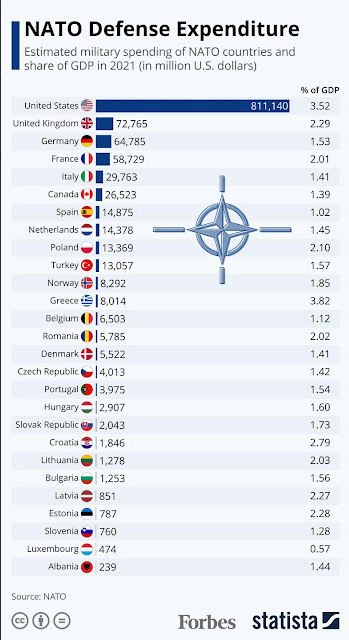World War Two
Published 23 Sep 2022The German Panzers are high on the list of the most feared and respected weapon systems of the Second World War. Much of their effectiveness however did not simply stem from technical or tactical superiority, but was achieved through rigorous training and the tight camaraderie of their crews. Days, weeks, or even months on end, the men operating a Panzer would stay together, maintaining the tank, and training for the battle to come. Through summer and winter, heat and snow, mud and rain, the tank would become their home.
(more…)
September 24, 2022
Life Inside a Panzer – Tank Life Part 1 – WW2 Special
PayPal shuts down the Free Speech Union’s account for some reason
Ellie Wheatley on PayPal’s arbitrary decision to cut off the Free Speech Union’s account without notice:
The irony of the Free Speech Union’s PayPal account being shut down is that it proves we are in need of the union more than ever.
The online payment company shut down the FSU’s account (thus making it more difficult for people to donate) without any clear explanation as to why it did so. The same was done to its founder, Toby Young, and his online newspaper, the Daily Sceptic.
The shame is, PayPal is an innovative tech company that has made transferring money almost seamless for millions across the world. You can donate money to an organisation within seconds; there’s no faff trying to find your credit card, or having to re-type your details for the twentieth time that week. It’s a brilliant service that has made life easier for many people, businesses and charities. PayPal is not a political company, it’s a tech company worth over $102bn, so why have they been banning other organisations from using their services?
Although PayPal said they couldn’t comment on the decision, they did proclaim that they “weren’t discriminatory”, but is this really true?
Is it unclear whether they shut down these accounts simply because they disagreed with what the FSU and Toby Young stand for. Although PayPal hasn’t clarified what exactly FSU and Toby Young did wrong, it appears that they must have breached their acceptable use policy. This includes myriad of things but the most prominent are hate speech and “misinformation” on topics such as the COVID vaccine.
Hate speech is one thing (although it seems that anything can be deemed offensive and hateful now) but “misinformation” about topics being a breach of policy takes us down a dark and sinister path.
Misinformation is a term that is often used to label content that goes against the elite or prevailing “groupthink” point of view. Questioning mainstream thought is unacceptable, and it breaches Big Tech’s policy, thus you can (and often will) be shut out.
Business Intrigue Gone Wrong: High Powers for Oman
Forgotten Weapons
Published 16 May 2022The story of the Browning High Power pistols with Omani national crests is an interesting one. It begins with a man named Paul Van Hee brokering a contract for Cadillac-Gage “Commando” armored cars for the Omani government in the late 1960s. These were to be equipped with FN MAG machine guns, and it came to Van Hee’s attention that Oman might also be interested in High Power pistols. He wasn’t an FN agent, but figured he could make that deal happen (and presumably make a nice profit on it).
Van Hee imported 36 new High Powers into the US, and then had them engraved with Omani crests (although the first 9 were accidentally engraved backwards). Around the time he was showing the guns to the Omani delegation, though, the deal fell apart. FN got wind of it and arranged the sale themselves, eventually shipping 5,000 pistols to Oman (without any special markings).
The demonstration guns remained in the US, and were sold off onto the collector market having never actually seen Oman. Interestingly, they are exempted from the NFA when fitted with original Belgian shoulder stocks, like this one is.
(more…)
QotD: The evolution of the domestic corridor
I live in an ancient city, in a medium-old apartment — one that is rapidly approaching its bicentennial. Like any building in continuous occupation for nearly 200 years, form and function have changed: it’s been retrofitted with indoor plumbing, gas central heating, electricity, broadband internet. The kitchen has shrunk, a third of it hived off to create a modern (albeit small) bathroom. The coal-burning fireplaces are either blocked or walled over. Three rooms have false ceilings, lowered to reduce heating costs before hollowcore loft insulation was a thing. What I suspect was once the servants’ bedroom is now a windowless storeroom. And rooms serve a different function. The dining room is no longer a dining room, it serves as a library (despite switching to ebooks a decade ago I have a big book problem). And so on.
But certain features of a 200 year old apartment remain constant. There are bedrooms. There is a privy (now a flushing toilet). There is a kitchen. There is a living room. And there is a corridor.
This apartment was built around 1820, for the builder of the tenement it’s part of: he was a relatively prosperous Regency working man and his family would have included servants as a matter of course in those days. And where one has servants, one perforce has corridors so that they may move about the dwelling out of sight of the owners. But it was not always so.
Rewind another 200 years and look around a surviving great house, such as Holyrood Palace, also in Edinburgh. Holyrood largely dates to the 16th and 17th century, and reflects the norms of that earlier era, and if you tour it one thing is noteworthy by its absence: corridors. The great houses of that period were laid out as a series of rooms of increasing grandeur, each leading to the next. Splendid wide main doors in the centre of each wall provided access for nobility and people of merit: much smaller, unadorned doors near the corners allowed servants to scuttle unobtrusively around the edges of the court. Staircases ascended through grand halls at the centre of such houses (accessible from doors leading to the main function rooms around the periphery): servants’ areas such as the kitchen, stores, and pantry might boast their own staircases, and the master apartments of a great house had their own stairs leading to privy or ground floor.
But the corridor in its modern, contemporary sense seems to have started out as a narrowing and humbling of the grand halls and assembly rooms of state, reduced in scope to a mere conduit for the workers who kept things running — before, of course, they later became commonplace.
Charles Stross, “Social architecture and the house of tomorrow”, Charlie’s Diary, 2019-04-29.
September 23, 2022
Lessons from the Eighteenth Century for the Russo-Ukraine conflict
In Strategika, Edward Luttwak considers what lessons can be drawn from wars of the past to help inform the ongoing Russian invasion of Ukraine:
Every war must end, but no war need end quickly — neither world war makes it to the top ten in longevity. The nearest parallel to the Ukraine war – the Dutch War of Independence (1568–1648), fought between a smaller but more advanced nation, and the world-spanning Spanish Empire, the superpower of the age – persisted for eighty years because the Spanish kept losing, but there was so much ruination in that declining power.
In our own days, expeditionary wars fought against enemies far away who could hardly fire back, lasted for many years as the different war-ending theories promoted by fashionable generals were tried seriatim to no avail, till the day when evacuation was preferred even if utterly ignominious.
The eighteenth-century wars fought by rival European monarchs who could all converse in French with each other, were enviously admired in the bloody twentieth century, because they allowed much commerce and even tourism to persist — utterly unimaginable even in Napoleon’s wars, let alone the two world wars — and because they ended not in the utter exhaustion of the collapsing empires of 1918, nor in the infernal destructions of 1945, but instead by diplomatic arrangements politely negotiated in-between card games and balls. The 1763 Treaty of Paris that ended the Seven Years’ war and French America, inadvertently opening the way for the American republic, was not drafted by the victorious British Prime Minister Lord Bute, but by his very good friend the French foreign minister Étienne-François de Stainville, duc de Choiseul, who solved the three-way puzzle left by the French defeat by paying off Spain with Louisiana, Britain with money-losing Canada, and regaining the profitable sugar islands for France, which still has them.
And instead of the winners charging the losers with incurable bellicosity as Versailles did with Germany, or stringing them up individually as war criminals, as in the ending of twentieth-century wars, eighteenth-century winners were more likely to console the losers just short of “better-luck next time” — and in a century in which there was war every single year without exception from 1700 to 1800, if one war ended another necessarily started or at least persisted, allowing a “next time” soon enough.
By contrast, the ensuing nineteenth-century wars held no lessons at all for the twentieth century, which was equally bereft of a Napoleonic superman at the start and ample tropical lands easily conquered later on, while the Crimea expedition in the middle was mostly a counter-example of how not to wage war, and the Franco-Prussian war was just as sterile: all it proved was that there really was only one Helmuth von Moltke who could win wars by parsimonious force, unlike his homonymous nephew who lost a five-year war in its first five weeks; and that there really was only one Otto von Bismarck, who crowned his incomplete 1871 unification of German lands by refusing to complete it by unifying all Germans as the Italians were unified, lest the world combine to make a bigger Germany smaller.
Clearly only the eighteenth-century precedents apply to the Ukraine War. Neither Putin nor Zelensky speaks French but neither needs it to converse in their Russian mother-tongue, and if they do not actually talk (Putin demurely said that he could not possibly be expected to negotiate with Kiev’s drug addicts and Neo Nazis), their officials certainly can, and do so often.
When it comes to the persistence of commerce in war — the habit that Napoleon wanted to break with his Blocus Continental against British exports — every day Russian gas flows to the homes and factories of Ukraine on its way into Western Europe, with Ukraine transferring money to Russia every day, even as it attacks its faithful customer. And, Ukrainian wheat is now shipped past Russian navy vessels to reach the hungry Middle East, after a negotiation unthinkable in twentieth-century wars, or in Napoleon’s either.
In Russia, sanctions have certainly diminished easy access to imported luxuries in local franchised shops, but they still arrive via Turkey at a slight premium … or discount depending on the previous Moscow markup. All over Russia the sanctions have been felt in all sorts of ways because the country was actually more internationalized than anyone realized, including Putin no doubt (arriving in Tomsk at 0600 one winter morning at a temperature of minus infinity, the one place to eat was McDonalds).
But unlike China, which must choose between fighting and eating protein — some 90% of its chicken, pork, and beef is raised on imported cereals plus some 150 million metric tons of soya per annum from U.S. and Canadian Pacific ports, or the Atlantic ports of Brazil and Argentina that would be an ocean too far for China-bound vessel – Russia produces all its own staple foods and can therefore fight and eat indefinitely, and neither does it import any energy as China must.
In other words, just as Russian propaganda has claimed from day one, the sanctions cannot stop the war materially, even if they played a large role in the flight of tens of thousands of elite Russians, once again diminishing the human capital of the largest European nation, as the Bolsheviks and Civil War did a century ago, and the opening of borders did again a generation ago.
It is a problem that the sanctions, which end the war by stopping Russia, might cause defections from the Western camp if the winter happens to be unusually cold, a subject on which Angela Merkel – so enthusiastically applauded for closing nuclear power stations and preferring Russian piped gas over American and Qatari liquified gas – has remained strangely silent.
Is This Atlanta Streetcar “The Worst Transit Project of All Time”?
ReasonTV
Published 22 Sep 2022Transit ridership, especially rail, has collapsed post-pandemic, but the Atlanta BeltLine Coalition says now is the time to take federal dollars and build a $2.5 billion streetcar.
Full text and links: https://reason.com/video/2022/09/22/i…
—
Twenty-three years ago, Atlanta-native and architecture and urban planning student Ryan Gravel had an experience that opened his mind to what urban living could be.“My senior year I spent abroad in Paris and lived without a car for a year and traveled by train everywhere,” says Gravel. “And within a month of arriving, I had lost 15 pounds. I was in the best shape of my life because I was walking everywhere, and the role of the physical city was made clear to me in a way it really had never been before.”
For his Georgia Tech master’s thesis, Gravel sketched out a plan to make Atlanta more like Paris. He proposed redeveloping the land along the city’s historic rail lines to create a 22-mile loop called the Atlanta BeltLine. He proposed turning the city’s abandoned industrial areas and single-family home neighborhoods into business districts and walking trails. And he proposed connecting downtown to the rest of the city all with a new train running along the entire Atlanta BeltLine.
“I never imagined we would actually do it,” says Gravel.
But they did — for the most part. Cathy Woolard, who was president of the Atlanta City Council, read Gravel’s thesis and decided to use it as a blueprint to remake much of the city. Today, the Atlanta BeltLine is a walking and biking trail, parts of which are bordered by retail and condos.
But one piece of Gravel’s grand vision didn’t get built: The train.
Today, Gravel runs a co-working and event space along the BeltLine, which also serves as a gathering place for urbanists interested in making Atlanta less dependent on cars. He says that the train line is essential for improving city life.
“In those early days, when we built the movement behind the [BeltLine] project, it was around transit,” says Gravel.
The three COVID relief bills set aside $69 billion in federal funding for local transit agencies to operate and add to their transportation systems, meaning that Atlanta might finally get its train—with many American taxpayers who will never step foot on it picking up much of the tab.
Many American cities have used federal money in the past to build rail transit lines that suffer from dismal ridership, that are expensive to maintain, and that are a major drain on their budgets.
(more…)
Sarah Hoyt on the Overton Window
At According to Hoyt, Sarah considers the Overton Window:

Diagram of the “Overton Window”, based on a concept promoted by Joseph P. Overton (1960–2003), former director of the Mackinac Center for Public Policy. The term “Overton Window” was coined by colleagues of Joe Overton after his death. In the political theory of the Overton Window, new ideas fall into a range of acceptability to the public, at the edges of which an elected official risks being voted out of office.
Illustration by Hydrargyrum via Wikimedia Commons
The Overton window is not natural to human society. It is the product of the mass-information-media-entertainment era.
No?
Sure, in some villages, or some other places, there are things you can’t see/say. That is usually because someone in that society, be it a village or a nation, is going to get under your nose for saying it. (At one point, you could get arrested in Portugal for shouting “Portugal is a sh*tty country!”)
Having “Unsayable” and “Unthinkable” and “if you say that in public you’ll be shunned” is always a sign of an oppressive society, whether the punishments are physical or mental, beatings or mere shunning.
Having beliefs that are beyond the pale — in fact, the existence of the pale — are a sign of an unhealthy society, one in which a truth is being enforced that is different from reality.
No? Fight me.
Look, yeah, sure, there are things people in all eras didn’t discuss in certain company due to manners or delicacy. One didn’t discuss sexual acts in front of children, not equipped to understand them, in most of the west since the onset of Christianity. One didn’t say certain things in front of elders either. “Gentlemen don’t discuss politics or coitus”. But that was a matter of — in a small gathering, or a confined society — keeping the social gears lubricated, and keeping disagreements at bay. What “couldn’t be said” varied.
However, the Overton window is something else. It is “you can’t report certain things, even if they are true, at the risk of becoming a social pariah”.
It avoids discussions of really important things, like how our kids are being sodomized by public education. Or how welfare really doesn’t contribute to the welfare of anyone. Or how Child Protective Systems is a money-laundering scam, in which kids die. Or how our government-funded science has become all government and almost no science. Etc.
It encourages rape rings like Rotherham, and has most of the black population of the US believe they are more at risk of police shootings than whites, which is plainly not true, but can’t be said, because the media has deemed saying so is “racist” (Somehow.) So people live in fear, rather than knowing they’re not at higher risk than anyone else.
And while speaking of risk, the media, and its control of information and encouragement of shunning dissenters, has led to fear of a “slightly more dangerous” flu, and led to elderly people living their last years in isolation and terror, and also led to our kids being isolated into loss of social function.
Furthermore, the only way to keep the Overton window over a whole country is to enforce strict control over the media, and even social media, and to ruthlessly crush down dissenters, so that everyone appears to agree, leading to shock-rejection of those who manage to break through the wall of government-encouraged-enforced lying.
A wall that they try to keep even when the lies are patently absurd and harmful. (Like the idea anyone who dislikes the Biden reign of terror is a terrorist or insurgent, or for that matter racist.)
The Overton window can suck what I don’t have.
A Short History of Ships Cats – Floating Felines, Maritime Moggies and Kleptomaniac Kittens
Drachinifel
Published 26 Feb 2020A quick look at the origins of a vital part of the ship’s maintenance crew, and some notable examples.
(more…)
QotD: Ron DeSantis for Caesar?
Oswald Spengler suggests that we’re in for a period of Caesarism, which is warlord rule that maintains the trappings of the old system. It might be as simple as [Mussolini]’s old litmus test: Do the trains run on time? But, since this is Clown World, fake and gay: Are the lights on for more than two days running?
Ron DeSantis, for example, has gotten a lot of Grillers’ panties moist, and while that’s one of the strongest possible arguments for the proposition that he’s just another Swamp Thing — Ace of Normies might not remember how hard he used to squeeeee for fucking Paul Ryan, but I do — it’s nonetheless true that Ron DeSantis has acted at least kinda sorta like … what’s the word?
Ah yes: An adult.
Ron DeSantis’s response to Covid was pretty much exactly what even the most flaming moonbat liberal governor would’ve done as late as 1990, because there were still some grownups in politics back then. Now that the entire Swamp is filled with autistic Mean Girls with PMS, the State can’t carry out even its most basic functions. Governors still have real power […], and there are a few of them that aren’t totally retarded, and so I’d imagine we’ll see a period of retail-level Caesarism — the lights are on three days a week in Nebraska; quick, everybody load up the Conestoga wagon and head for Omaha!
Severian, “Friday Mailbag”, Founding Questions, 2022-06-17.
September 22, 2022
RAF Coastal Command vs U-Boats
The History Guy: History Deserves to Be Remembered
Published 5 Oct 2020The contest between aircraft and U-Boats during the Second World War was one of competing technological innovations, culminating with a decisive struggle in the summer of 1943. The History Guy tells the forgotten story of the development of anti-submarine warfare and the contest between the aircraft of RAF Coastal Command and U-Boats of the Kriegsmarine in the Bay of Biscay.
(more…)
Waking – or shaking – NATO’s freeloaders (like Canada)
CDR Salamander has a proposal to encourage cheapskate freeloaders like Justin Trudeau’s Canada (although it didn’t start with him … Canada has been freeloading militarily since the early 1970s) to take on more like a fair share of NATO’s needs:
President Vladimir Putin on Wednesday ordered Russia’s first mobilisation since World War Two and backed a plan to annex swathes of Ukraine, warning the West he was not bluffing when he said he’d be ready to use nuclear weapons to defend Russia.
In the biggest escalation of the Ukraine war since Moscow’s Feb. 24 invasion, Putin explicitly raised the spectre of a nuclear conflict, approved a plan to annex a chunk of Ukraine the size of Hungary, and called up 300,000 reservists.
This should not be a shock to anyone. If it is, perhaps you should consider investing your time in cat-blogging.
It should bring to the front that NATO can no longer allow unserious nations to play like they are anything but security free-riders. They need to contribute their fair share or pay some consequence. Alliances have benefits and responsibilities. You should not have one without the other.
While percentage of GDP is an imperfect measure of contribution, it is better than all the other ones. It is as simple benchmark of national effort.
As these are the best numbers we have, let’s look at 2021 and then forward.
It is amazing that after all Russia has shown Western Europe — both of its nature and the nature of modern warfare — that so many of our NATO allies continue to slow walk defense spending, doing the very minimum to be a full and fair partner in the alliance.
Russian victory — however they define it — or Russian defeat — however Ukraine defines it — will not change the geography or nature of Russia. She is not going anywhere.
So, what’s to be done to encourage nations like Canada to put up or shut up? This might help:
“Out years” are where dragons live, so anyone not on guide-slope to 2%+ by the end of 2023 – when one way or another the Russo-Ukrainian War should be over – will find someway to not get there in a wave of excuses and bluffing.
We should call their bluff.
As such, and this is generous, we need to finally pursue PLAN SALAMANDER for NATO “Flags-to-Post” that I first proposed almost six years ago.
In NATO, General and Flag Officer billets are distributed amongst nations in a rather complicated way, but this formula is controlled by NATO – and as such – can be changed.
Entering argument: take the present formula for “fair distribution” and multiply by .75 any nation that spends 1.5% to 1.99% GDP on defense. Multiply by .5 any nation that spends between 1.25% to 1.499%. Multiply by .25 1.0% to 1.240%. If you fall below 1%, you get nothing and your OF5 (Col./Capt) billets are halved.
1.25x for 2.01%-2.25%. 1.5X for 2.26%-2.75%; 1.75x for 2.76% -3.0%. 2x for +3.01%.
The math gets funky when a lot of people get over 2%, but we can refine it later. Doesn’t cost a penny and will unquestionably get the attention of those nations. Trust me on this. By January 1st, 2024 no more excuses. A small and symbolic punishment, but a good start that may be all that is needed. This is not the second half of the 20th Century any more.
Why Electronic Voting Is Still A Bad Idea
Tom Scott
Published 9 Dec 2019We still shouldn’t be using electronic voting. Here’s why.
(more…)
California’s Central Valley of despair
At Astral Codex Ten, Scott Alexander wonders why California’s Central Valley is in such terrible shape — far worse than you’d expect even if the rest of California is looking a bit curdled:
Here’s a topographic map of California (source):
You might notice it has a big valley in the center. This is called “The Central Valley”. Sometimes it also gets called the San Joaquin Valley in the south, or the the Sacramento Valley in the north.
The Central Valley is mostly farms — a little piece of the Midwest in the middle of California. If the Midwest is flyover country, the Central Valley is drive-through country, with most Californians experiencing it only on their way between LA and SF.
Most, myself included, drive through as fast as possible. With a few provisional exceptions — Sacramento, Davis, some areas further north — the Central Valley is terrible. It’s not just the temperatures, which can reach 110°F (43°C) in the summer. Or the air pollution, which by all accounts is at crisis level. Or the smell, which I assume is fertilizer or cattle-related. It’s the cities and people and the whole situation. A short drive through is enough to notice poverty, decay, and homeless camps worse even than the rest of California.
But I didn’t realize how bad it was until reading this piece on the San Joaquin River. It claims that if the Central Valley were its own state, it would be the poorest in America, even worse than Mississippi.
This was kind of shocking. I always think of Mississippi as bad because of a history of racial violence, racial segregation, and getting burned down during the Civil War. But the Central Valley has none of those things, plus it has extremely fertile farmland, plus it’s in one of the richest states of the country and should at least get good subsidies and infrastructure. How did it get so bad?
First of all, is this claim true?
I can’t find official per capita income statistics for the Central Valley, separate from the rest of California, but you can find all the individual counties here. When you look at the ones in the Central Valley, you get a median per capita income of $21,729 (this is binned by counties, which might confuse things, but by good luck there are as many people in counties above the median-income county as below it, so probably not by very much). This is indeed lower than Mississippi’s per capita income of $25,444, although if you look by household or family income, the Central Valley does better again.
Of large Central Valley cities, Sacramento has a median income of $33,565 (but it’s the state capital, which inflates it with politicians and lobbyists), Fresno of $25,738, and Bakersfield of $30,144. Compare to Mississippi, where the state capital of Jackson has $23,714, and numbers 2 and 3 cities Gulfport and Southhaven have $25,074 and $34,237. Overall Missisippi comes out worse here, and none of these seem horrible compared to eg Phoenix with $31,821. Given these numbers (from Google), urban salaries in the Central Valley don’t seem so bad. But when instead I look directly at this list of 280 US metropolitan areas by per capita income, numbers are much lower. Bakersfield at $15,760 is 260th/280, Fresno is 267th, and only Sacramento does okay at 22nd. Mississippi cities come in at 146, 202, and 251. Maybe the difference is because Google’s data is city proper and the list is metro area?
Still, it seems fair to say that the Central Valley is at least somewhat in the same league as Mississippi, even though exactly who outscores whom is inconsistent.
QotD: In my 20s … and in my 40s
Me in my 20s: Falls down flight of stairs. Brushes self off and gets on with life as usual.
Me in my 40s: Sleeps with head at slightly different angle than usual. Spends 3 weeks taking painkillers for neck pain whilst sobbing and wondering if my life will ever be the same again.
Amanda (@Pandamoanimum), Twitter, 2022-06-13.
September 21, 2022
Jonathan Kay on cultural appropriation
In Quillette, Jonathan Kay put together “a somewhat lengthy manifesto” on the topic of cultural appropriation in response to a request from Robert Jago who wanted to do an interview with Kay on this issue:

Justin Trudeau (Canada’s most prolific cultural appropriator) with dark makeup on his face, neck and hands at a 2001 “Arabian Nights”-themed party at the West Point Grey Academy, the private school where he taught.
Photo from the West Point Grey Academy yearbook, via Time
“Cultural appropriation” typically gets defined in a way that depends on whether one is defending it or denouncing it. If you’re defending it, you prefer to look at the big picture: Every new kind of art form, literary genre, style of dress, or cuisine typically represents a mix of inherited and borrowed elements. Shakespeare’s sonnets were written in an Iambic pentameter that Chaucer had “appropriated” from the French and Italians. So if Indigenous or African poets want to appropriate it from the English, no one has any basis for complaint. If you define cultural appropriation in this big-picture way, the concept isn’t just permissible. It’s artistically necessary, and indeed inevitable.
But if you’re denouncing cultural appropriation, on the other hand, the argument is more persuasive when your frame of reference is small, local, and community-rooted. I’m thinking of the (white) novelist or film director who passes through a region, and hears some garbled version of folklore that relates to a nearby Indigenous community. The guy thinks, “Oh wow, that’ll make a great novel” (or TV show, movie, etc.), and then makes a mint without consulting (let alone cashing in) the Indigenous community.
So the debate over cultural appropriation is like a lot of debates: It’s really easy to win if you get to define the terms. And since both sides pick definitions that suit them, it can become a dialogue of the deaf.
Indeed, there’s often no dialogue at all. Rather, both sides are apt to retreat into apocalyptic language about, respectively, (a) totalitarian censorship, and (b) white supremacist (cultural) genocide. This is absolutist language that leaves no room for nuance or discussion.
The cultural-universalism side of this dialogue is represented by people like me. I write about every topic under the sun, and so I get my back up when someone tells me that I’ve got to “stay in my lane”. My whole career is built around hopscotching from one idea to the next without worrying (much) about who gets offended. For me, the imposition of rules on what people are allowed to write about isn’t just an annoyance. It’s an existential threat to the creative faculties.
But if you’re on the other end of this — say, you’re a member of a small Indigenous community whose history and folklore have yet to be recorded or celebrated in any definitive form — you don’t care about some white guy in Toronto whining about how he can’t do the equivalent of wearing a sombrero on Cinco de Mayo. A small First Nations community might get only one real shot at telling its story to the world. If that shot gets used up by an outsider who strip-mines the locals’ oral history for a bestseller, that can no doubt feel like existential threat to one’s cultural autonomy. It’s like: “So you took our land, punished us for using our own language, sent our kids to residential schools, and now all we really have left is our culture, and you want to steal that, too?”
There’s this trite expression that often gets trotted out these days: Intent doesn’t matter, only the harm you cause. But of course, intent does matter. And if an author, director, or artist intends to respectfully and accurately include a community’s story in his or her work, then, for me, that’s very much a mark in their favour. That said, I absolutely do not think that this means there is an obligation to “honour” or “uplift” the community in question — let alone express “solidarity” or “allyship” with them. Doing so means you’re writing activist propaganda. What I mean, rather, is that you shouldn’t be intending to mock or belittle whole swathes of humanity.
The problem is that, in Canadian cultural circles at least, this isn’t really the standard that’s applied. I’ve spoken to a number of Canadian writers who, out of the best of intentions, invest their own funds in “sensitivity readers” — a process that can be not only expensive and time-consuming, but also creatively ruinous, since these consultants often are bursting with ideas about how to turn your novel or movie into a specimen of the above-referenced activist propaganda. I know one woman, in particular — a novelist — who appeared before a First Nations tribal council, and got its official permission to include a character in her book whose identity related to their community. But then a community member, someone not even involved with the band leadership, went after the woman and tried to smear her as racist. This is after she’d dotted every I and crossed every T of the sensitivity-reader process.








